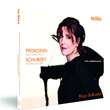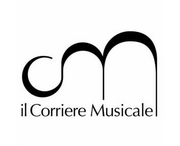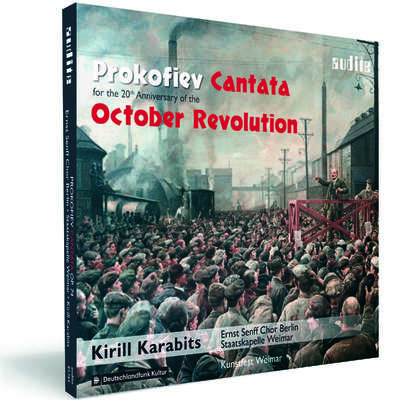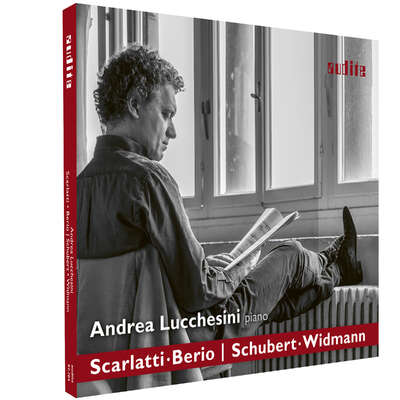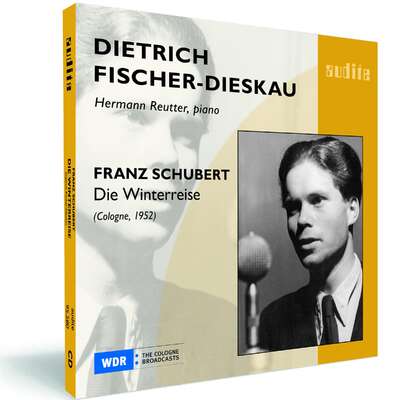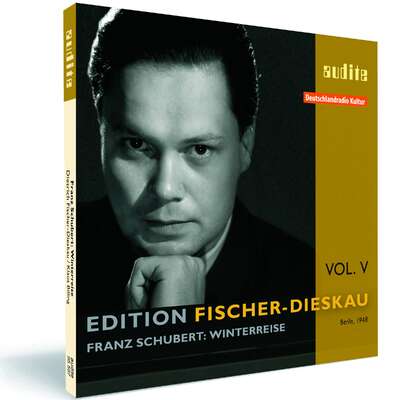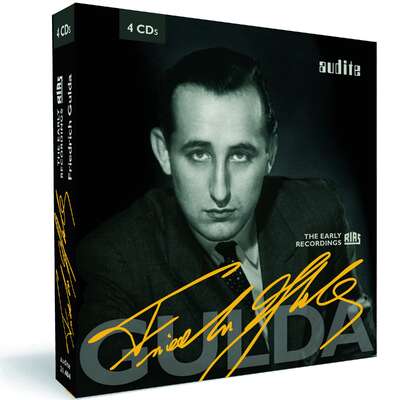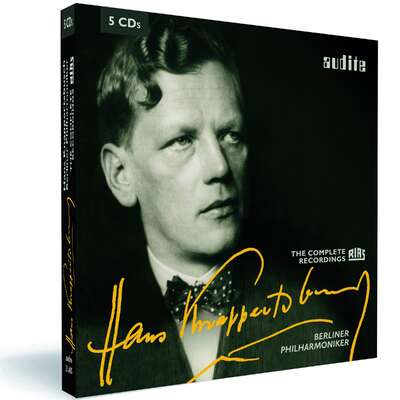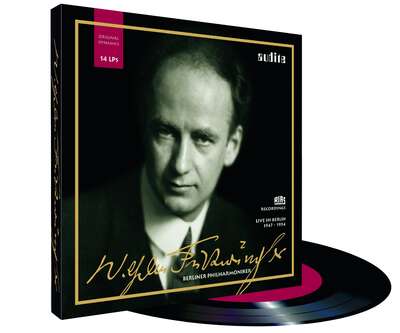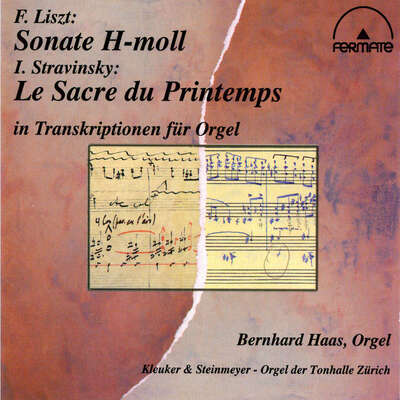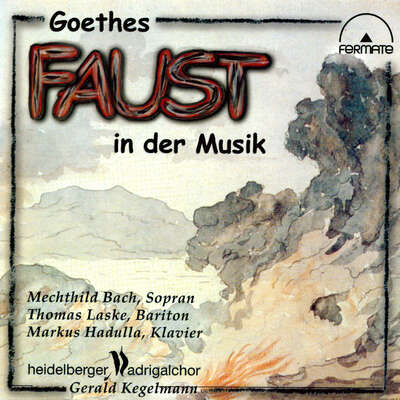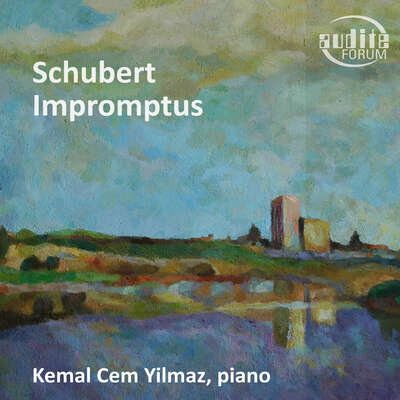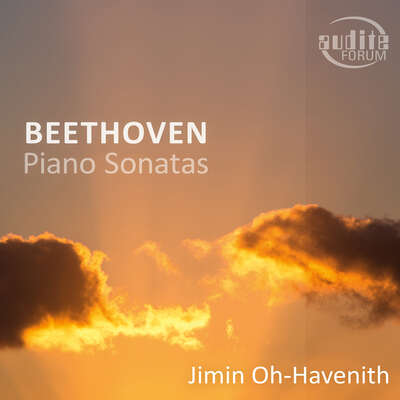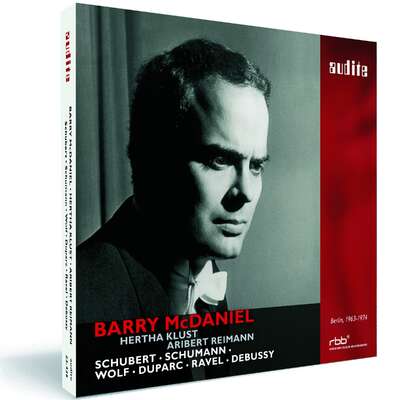
Prokofjew, der temperamentvolle Petersburger Feuerkopf, und Schubert, der stille Revolutionär aus Wien – das ist eine intelligente, in vieler Hinsicht spannende Zusammenstellung. Die Pianistin Elisso Bolkvadze, UNESCO Artist for Peace und in ihrer Heimat Georgien ein Superstar, legt hier Prokofjews Zweite Sonate und Schuberts Impromptus D 899 in einer glühenden und poetischen Interpretation vor.mehr
Prokofjew, der temperamentvolle Petersburger Feuerkopf, und Schubert, der stille Revolutionär aus Wien – das ist eine intelligente, in vieler Hinsicht spannende Zusammenstellung. Die Pianistin Elisso Bolkvadze, UNESCO Artist for Peace und in ihrer Heimat Georgien ein Superstar, legt hier Prokofjews Zweite Sonate und Schuberts Impromptus D 899 in einer glühenden und poetischen Interpretation vor.
Details
| Elisso Bolkvadze plays Prokofiev and Schubert | |
| Artikelnummer: | 97.719 |
|---|---|
| EAN-Code: | 4022143977199 |
| Preisgruppe: | BCA |
| Veröffentlichungsdatum: | 14. August 2015 |
| Spielzeit: | 48 min. |
Zusatzmaterial
Informationen
Sergej Prokofjew und Franz Schubert - das ist eine hochintelligente Zusammenstellung, welche die Stellung der beiden Komponisten zwischen Tradition und Erneuerung fruchtbar macht. Das Sonatenwerk von Prokofjew ist in Russland und den ehemaligen Ländern der Sowjetunion wesentlich präsenter als in Mitteleuropa, wo allenfalls die Siebte Sonate gelegentlich auf dem Programm steht. Dabei schuf Prokofjew mit seinen neun vollendeten Sonaten von der Jugend bis kurz vor seinem Tod im Jahr 1953 einen musikalischen Kosmos, welcher der Spannweite von Schostakowitschs Streichquartetten nicht unähnlich ist. Die aus der georgischen Hauptstadt Tiflis stammende Elisso Bolkvadze hat die Zweite Sonate aus dem Jahr 1912 ausgewählt, mit der Prokofjew einen unerhört delikaten, in seiner motorischen Energie aber auch aggressiven Ton anschlägt, der den modernistischen Geist in der russischen Hauptstadt St. Petersburg vor dem Ersten Weltkrieg widerspiegelt. Daneben hat Bolkvadze mit den vier Impromptus D 899 einen populären Zyklus aufs Programm gesetzt, dessen innovative Kraft meist unterschätzt wird. Denn Schubert hat neben den großen Klaviersonaten immer auch versucht, neue Formen mit kompakter, manchmal auch programmatischer Aussage zu erproben. Dazu gehören die Impromptus, die das Lyrische und Dramatische, das Gestische und reine Klangfarbenfelder vereinen. Die georgische Pianistin Elisso Bolkvadze wurde im Januar 2015 zum UNESCO Artist for Peace ernannt. Sie ist Preisträgerin zahlreicher internationaler Klavierwettbewerbe, darunter Van Cliburn, Vianna da Motta und Dublin International Piano Competition. Regelmäßig konzertiert sie als Solistin mit internationalen Orchestern und tritt mit Solorecitals in den großen Konzertsälen in Europa und den USA auf. In ihrem Heimatland ein echter Star, wurde sie 1993 mit einer der höchsten nationalen Ehrungen ausgezeichnet, der Ehrenmedaille der Georgischen Regierung. Im Jahr 2013 gründete Elisso Bolkvadze ihre eigene Stiftung „Lyra", die talentierte, georgische Nachwuchspianisten fördert. Sie ist künstlerische Leiterin des jährlichen Batumi Music Festivals in Georgien.
Besprechungen
Mezzo
| Sa 22.10. 10:35 - 12:00 | 22. Oktober 2016 | Quelle: http://www.tvspi...
BROADCAST
Elisso Bolkvadze joue Mozart, Schubert, Sogny et Prokofiev
Sendebeleg siehe PDF!Mehr lesen
Mezzo
| 03.10.2016, 17:50 - 19:15 Uhr | 3. Oktober 2016 | Quelle: http://www.tvspi...
BROADCAST
Elisso Bolkvadze joue Mozart, Schubert, Sogny et Prokofiev
Sendebeleg siehe PDF!Mehr lesen
Stereoplay | 09|2016 | Lothar Brandt | 1. September 2016 HighClass in HiRes
So vital und explosiv die Künstlerin Prokofieff abfeuert, so traumhaft und graziös findet sie den Weg in Schuberts zum Teil ja auch suchende, experimentelle Klangwelt.Mehr lesen
Fanfare | February 2016 | Huntley Dent | 1. Februar 2016
The Russian school of pianism rolls forward like an Energizer Bösendorfer bunny, apparently unstoppable. Not that I’d ever want it to stop, asMehr lesen
What sealed my enthusiasm for this new release was unexpected, a galvanizing reading of the Prokofiev Second Piano Sonata from 1912. We find the composer half-perched as bratty precocious Modernist—at 21, he was already a prominent member of St. Petersburg’s contemporary music culture—and an extremely knowing writer for piano, well on his way to developing a unique personal style. The Second Sonata, which stands in sequence between the scandalously raucous Piano Concertos Nos. 1 and 2, roams freely from Chopin through Liszt and Rachmaninoff, adding zingers and flashes of dissonance that must have sounded incongruous at the time. These innovations are squibs compared with the bombshell Stravinsky would drop the next year in Le Sacre, and it’s difficult to bring out a sharp profile for the whole work.
Bolkvadze manages to, however, by force of will, playing the first movement on a grander scale than, say Yefim Bronfman in his well-regarded Sony recording from 1995. At times he’s freer and more imaginative in his phrasing, but Bolkvadze has more impact. Prokofiev introduces fine-textured filigree as a contrast with power in the first movement, and Bolkvadze makes the two fit naturally together. There’s also more energy and personality throughout than with Bronfman.
Being a natural at Prokofiev has no predictive value in Schubert, and no matter how hard I squinted, the two composers don’t really belong together. Except for Richter, I don’t think of Russians pianists being very attuned to Schubert (even Horowitz made a hash of the late, great B♭ Sonata, on DG). The first set of Four Impromptus, D 899, is much loved and much recorded, so what does Bolkvadze have to add? Happily, she passes the bar insofar as her Schubert genuinely sounds like Schubert in its sensitivity, natural flow, and melodic grace. This is immediately apparent in her poised, tender reading of Impromptu No. 1 in C Minor.
I don’t hear Brendel’s refinement of touch, but I’m not sure that’s a lack; for all its fame, Brendel’s Schubert mostly strikes me as too cool and objective (although his Philips recording of the Impromptus is a standout). When an obscure pianist like Bolkvadze competes with great names, you wait for the moment when her imagination or technique falters in comparison. But it doesn’t. She builds the C-Minor Impromptu to a powerful climax that does justice to Richter’s impassioned Schubert, in fact.
Everything goes just as well in the remaining three pieces. In Impromptu No. 2 her left hand could spring the rhythm with more verve as the right hand is racing along. The middle section is considerably more forceful than the norm, but I count that a plus. This is a pianist with all the intrinsic style that the Russian school stands for, who also adds a lyricism and tenderness, beautifully exemplified in Impromptu No. 3’s enchanting melody, that even some illustrious Russian pianists didn’t possess.
It’s a delight to encounter, by chance, really, such a mature artist. Despite the chalk-and-cheese coupling of composers and the skimpy total timing, this recital disc is one to place on a short list of the year’s best. Clear, realistic piano sound; slimline cardboard packaging.
Piano News | Januar/Februar 1/2016 | Carsten Dürer | 1. Januar 2016
Wenn es zu den Sonaten Sergei Prokofiews kommt, muss der Interpret das Changieren zwischen Zynismus, Sarkasmus und lyrischer Ästhetik beherrschen, Gemütszustände wie Wut und Trauer zum Ausdruck bringen. Genau dies vermag die Georgierin Elisso Bolkvadze eindringlich! Ihre empathische Interpretation der 2. Sonate des jungen Prokofiew atmet den Geist der Zeit. Sie lässt dabei durchaus ihren eigenen Gedanken Raum, forciert und rafft Tempi, doch immer mit dem Blick, jede Nuance transparent mit gutem Klanggespür ins rechte Licht zu rücken. Das ist brillantes Spiel.Mehr lesen
www.artalinna.com | 1 décembre 2015 | Jean-Charles Hoffelé | 1. Dezember 2015 Grand écart
Pas pour Elisso Bolkvadze que je suis si heureux de retrouver dans ce disque où elle fait le grand écart entre Prokofiev et Schubert. Son jeu ample, profond et pourtant alerte, ses timbres si nourris qu’elle hérita de Tatiana Nikolayeva, mais sa touche si fusante tombent parfaitement dans l’écriture iconoclaste qui fait tout le sel de cette grande Sonate – près de vingt minutes – constituée par quatre pièces de caractère dont il faut pouvoir capturer les humeurs. Mehr lesen
www.classical.net | 01.11.2015 | Robert Cummings | 1. November 2015
Graffman, Richter, Glemser and many others have offered fine accounts of this sonata, but this one by Bolkvadze is also a worthy entry, particularly notable for its highly imaginative third movement. Prokofiev mavens will certainly want this.Mehr lesen
www.ilcorrieremusicale.it | 14 ottobre 2015 | Santi Calabrò | 14. Oktober 2015
Ai nostri giorni, tuttavia, Prokofiev non ha bisogno di essere legittimato: ormai viene unanimemente considerato un grande del Novecento, nessuno può metterlo in questione, e da un talento come la pianista georgiana Elisso Bolkvadze può arrivare perciò una chiave di lettura diversa.Mehr lesen
Gramophone | October 2015 | Patrick Rucker | 1. Oktober 2015
Until now, the Georgian pianist Elisso Bolkvadze has recorded primarily for the Sony Classical Infinity Digital and Cascavelle labels. On her latestMehr lesen
Her approach to the opening of Prokofiev's 1912 Second Sonata is redolent of Scriabin – plush, full-sounding and rife with detail. The rhythmic vitality of the Scherzo becomes waylaid by explorations of colouristic ornament and the misty haze enveloping the slow movement feels more French than Russian. The moto perpetuo of the finale rattles along at a splendid clip until it too is bogged down in an expressively overgrown contrasting section. In place of Prokofiev's brightly unambiguous colours and rhythmic elan vital, we encounter over-stuffed decor and aching expressivity.
The Schubert Impromptus are prevailingly lyrical, though the rhetorical eloquence and emotional urgency of each is diminished by indecisive rhythmic underpinning. For all its admirably vivid contrasts, the C minor Impromptu seems to wander, uncertain of its ultimate goal. The E flat Impromptu comes off as more notey than•fleet, while the abandon of its contrasting section is impeded by undue focus on inner voices. The golden melody of the beloved G flat major threatens to come untethered and float into the ether for lack of an adequately anchoring bass.
Throughout the disc, Bolkvadze's undeniably sensitive playing moves note to note. We are invited to admire each tree, if not each individual leaf, heedless of the magnificent forest surrounding us. Combined with a certain stylistic ambiguity with regard to both composers, the result lacks a strong personal stamp, prompting the question of just how fully Bolkvadze inhabits the music she plays.
As for alternatives in this music, both Frederic Chiu (Harmonia Mundi - nla) and Anne-Marie McDermott's complete Prokofiev cycles are of sustaining interest and Pletnev has a great deal to say in the Second Sonata. In the more personal realm of Schubert preferences, the performances of D899 by Maria-Joao Pires, Imogen Cooper and Vassily Primakov are more compelling.
Pizzicato | 10/09/2015 | Guy Engels | 10. September 2015 Filigran und einfühlsam
Seit Januar ist die georgische Pianistin Elisso Bolkvadze UNESCO-Botschafterin für den Frieden. Nun hat sie die damals angekündigte Einspielung mitMehr lesen
Dies scheint jedoch nicht das Naturell der Künstlerin zu sein, die sich in Schuberts Impromptus vor allem von ihrer lyrischen Seite zeigt. Elisso Bolkvadze hat einen ganz entspannten Zugang zu Schubert – unaffektiert, ohne romantisches Brimborium. Ganz selbstverständlich perlt die Musik aus ihren Fingern in den Melodienkaskaden der Impromptus 2 und 4. Dazwischen setzt Elisso Bolkvadze mit kräftigeren Konturen die passenden Kontraste – etwa in der Beethovenschen Schicksalshaftigkeit von Impromptu 1 oder im Mittelteil von Impromptu 4.
Mostly lyrical and thoughtful performances, very suitable for Schubert, a bit to kind for Prokofiev. Yet, at the end, one has a very positive impression from the very sensitive Elisso Bolkvadze.
Pianiste | n° 94 Bimestriel septembre-octobre 2015 | S.F. | 1. September 2015
De Prokofiev, elle ressent l'oeuvre de manière viscérale. [...] Il est dommage que la discographie de cette artiste soit aussi peu étoffée ... Un album magnifique.Mehr lesen
Der neue Merker | September 2015 | Dr. Ingobert Waltenberger | 1. September 2015
Die große Überraschung der Neuerscheinung bilden [...] die vier wahrlich traumhaften gespielten Impromptus von Schubert. Bei allem experimentellen Gestus und verzweifelter Suche nach pianistischen Neuland der Komposition (der große Beethoven lässt grüßen) ist kaum eine heutig wienerischere Wiedergabe denkbar.Mehr lesen
Classica – le meilleur de la musique classique & de la hi-fi | n° 175 septembre 2015 | Stéphane Friedrich | 1. September 2015
De Prokofiev, elle ressent l'oeuvre de manière viscérale. [...] Il est dommage que la discographie de cette artiste soit aussi peu étoffée ... Un album magnifique.Mehr lesen
